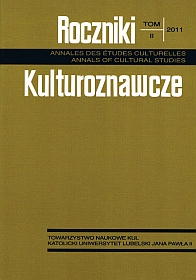John Locke’s Rationalism of Intellectual Culture
Abstract
This paper seeks to discuss the problems of John Locke's epistemology. Locke was a characteristic representative of the idea of the Enlightenment. This text focuses on a broader intellectual context of Enlightenment solutions that refer to socio-political issues and to one's outlook.
The structure of An Essay Concerning Human Understanding suggests that empiricism results from antinativism, nevertheless the logic of Locke's considerations makes us agree that this solution is a systematic consequence of a more basic reasoning. It is difficult not to appreciate the importance of Locke's reflection with regard to the assessment of human cognitive abilities. His assessment is made evident in the theory of knowledge, the importance of human praxis, and also in the specific character of his theory of science in the sense of modern natural history. This may lead to the distinction of two levels of his reflection on knowledge, i.e. the official level and the non-official level, in the form of normative and descriptive analyses, the analyses that deal with methods applied in scientific practice or beliefs formulated for the sake of practical life. The first level would correspond to 'hard' empiricism, the kind of empiricism characteristic of the 2nd book of An Essay Concerning Human Understanding; the second level is found in book four: rationalism that dominates, however, even over the first approach. In this context there is a need to go beyond the legitimation of only the narrow circles of truths that belong to proper learned knowledge based on empiricism, such knowledge that is objectified and certain. We need to legitimise more modest convictions formulated on a rational basis, convictions with subjectivistic elements (“belief,” “assent”).
References
Aaron R.I.: John Locke. Oxford 19552.
Alexander P.: Ideas, Qualities and Corpuscles. Locke and Boyle on the External World. Cambridge 1985.
Armstrong D.M.: Belief, Truth and Knowledge. Cambridge 1973.
Baumgartner W.: Naturrecht und Toleranz. Untersuchungen zur Erkenntnistheorie und politischen Philosophie bei John Locke. Würzburg 1979.
Die Philosophie des 17. Jahrhunderts. T. 3. England. Red. J.-P. Schobinger. Basel 1988.
Janeczek S.: Logika czy epistemologia? Uwarunkowania nowo%ytnej koncepcji logiki. Lublin 2003.
Locke J.: Problems and Perspectives. Red. J.W. Yolton. Cambridge 1969.
Locke J.: Rozwa%ania dotycz"ce rozumu ludzkiego. T. 1-2. Przeł. B. Gawecki. Warszawa 1955.
Locke J.: The Works of John Locke. T. 1-10. London 18233 (repr. Aalen 1963).
Ogonowski Z.: Locke. Warszawa 1972.
Philosophy, Science and Religion in England 1640-1700. Red. R. Kroll, R. Ashcraft, P. Zagorin. Cambridge 1992.
Philosophy, Religion and Science in the Seventeenth and Eighteenth Centuries. Red. J.W. Yolton. Rochester 1994.
Popkin R.H.: The History of Scepticism Erasmus to Spinoza. Berkeley 1979.
Price H.H.: Belief. London 1969.
Reedy G.: The Bible and Reason. Anglicans and Scripture in Late Seventeenth-Century England. Philadelphia 1985.
Reventlow H.G.: The Authority of the Bible and the Rise of the Modern World. Philadelphia 1985.
Schouls P.A.: The Imposition of Method. A Study of Descartes and Locke. Oxford 1980.
Shapiro B.J.: Probability and Certainty in Seventeenth-century England. A Study of the Relationships between Natural Science, Religion, History, Law, and Literature. Princeton (N.Y.) 1983.
Spellman W.M.:, John Locke. New York 1997.
Spellman W.M.: The Latitudinarianism and the Church of England 1600-1700. Athens (Ga.) 1993.
Van Leeuwen H.G.: The Problem of Certainty in English Thought. 1630-1690. The Hague 1963, 19702.
Weyer S.: Die Cambridge Platonists. Religion und Freiheit in England im 17. Jahrhundert. Frankfurt am Main 1993.
Wolterstorff N.: John Locke and the Ethics of Belief. Cambridge 1996 (repr. 1999).
Wood N.: The Politics of Locke’s Philosophy. Berkeley 1983.
Woolhouse R.S.: Locke’s Philosophy of Science and Knowledge. A Consideration of Some Aspects of „An Essay Concerning Human Understanding”. Oxford 1971.
Willey B.: Science and Religion in Seventeenth Century England. Ann Arbor (MI) 1973.
Yolton J.W.: A Locke Dictionary. Oxford 1993
Yolton J.W.: John Locke and the Way of Ideas. Oxford 1956.
Yolton J.W.: Locke and the Compass of Human Understanding. Cambridge 1970.





